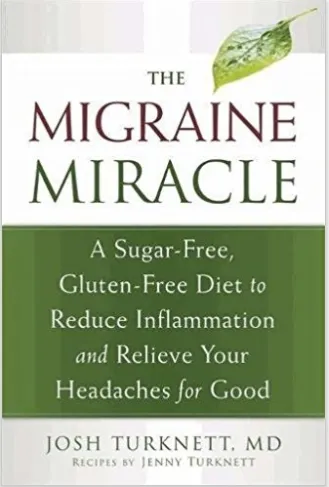
The Migraine Miracle
First book review! For a monthly glimpse into what I am reading, I decided to start with a very practical book—practical for my patients, and in a way, for myself. My friend and colleague, Dr. Josh Turknett, has had amazing success with his own and his patients’ migraine headaches by following a thorough template of ancestral health. I spent some time this weekend enjoying his incredibly helpful and thorough book, The Migraine Miracle.
Dr. Josh Turknett (Dr T) is a board-certified neurologist and clinical researcher into all things neurological! While we’d love to pick his brains on a variety of topics, he has opened a window for us into the world of migraines.
Migraine headaches, the bread and butter of every neurologists’ practice, have baffled physicians seeking to manage what can be horrendous cycles of pain for their patients. Research has looked somewhat into the causes of migraine, and identified more contributory factors than I had been aware of. Not only are genetics, lack of sleep, dietary indiscretions all problematic, but so are changes in blood sugar, activity level, and even hydration. For those with migraines, you might find an answer just perusing the list of triggers! I also had never realized that there is no such thing as a sinus headache: it’s probably a migraine, that has elicited some sinus congestion, but there is no pathological line that leads from a congested sinus to a severe headache! Who knew!
Dr. T himself had struggled with his own migraines, relying heavily on avoiding the conventionally understood “triggers” for migraines as much as possible. He also knew that he had to, as much as possible, avoid the conventional treatment for migraines: the most successful and popular migraine aborting drugs are known as triptans.
Granted, triptans can seem miraculous themselves: taken promptly at the start of a migraine, they stop the cycle of prodrome—aura—pain—hangover, the four stages of migraine he describes so clearly in the b ook. (Here’s my connection: I only have the aura, a so-called visual migraine, but I have long wondered why I’ll get a series of auras over a week or so and then not again for a long time. I have some insights now!) The real problem with triptans is that they are as well known for causing rebound headaches as they are for curing them in the first place. (If you started taking a daily triptan, you would get daily migraines as each triptan wore off.) There has to be a better way, right?
What I really loved about this book was Dr. T’s process of accidental discovery!
With no thought of his migraines, he came across information that called into question that tiny amount of nutritional wisdom we were taught in medical school: very tiny in value but huge and vast in its impact on how we speak to and think about the problems of our patients. His first serious piece of study was Gary Taubes’ Good Calories, Bad Calories. In my experience, anyone who takes the trouble to wade through this dense (but enjoyable book), can never go back: lower carb eating is the way of their future. Dr. T took off from there and explored the wider range of ancestral wisdom that suggests we learn from ways of the past.
What happened next sounds like one of those Facebook teaser posts, “He changed his diet and what happened next changed his life and could change yours.” But instead of clicking through to a cute cat video, Dr. T helps us switch gears on migraine management.
Doctors tend to think about disease in two different ways. One is: “Well, gee, so sorry that’s happened to you, let’s see what we can do to fix it.” The second is: “Your body should be smarter than that, humans have evolved to be pretty darn healthy. What might you be able to tweak back to optimal to regain your own health?” When switching to an ancestral diet almost completely eradicated his migraines, Dr. T became a dedicated adherent to the second way of treatment in his approach to migraines.
So, you ask, what you might do to break the migraine cycle? Try a strictly Paleo or Whole30 diet: no grains, legumes, dairy, or sugar!! Avoid vegetable oils like the plague (make your own salad dressing, please.) Normalize your sleep: sleep from dark to dawn, regularly, every night. Everyone has stress: identify yours and find a way to handle it. Exercise sanely.
Now maybe that last paragraph had a clue that is just the missing piece you’ve needed, but I encourage you, if you have migraines, get the book for yourself! In addition to a thorough and enjoyable jaunt through all the different aspects of migraine understanding and avoidance, Dr. T has great insights about each of the suggestions he makes for migraine prevention.
And maybe best of all, his wife Jenny has helped tremendously by offering a wealth of delicious looking recipes and a 21-day meal plan. Just enough appeal and direction to get someone started!
So, if you or someone you know suffers from migraines: get the book. I’d love to hear from you if you try his program, does it help?

